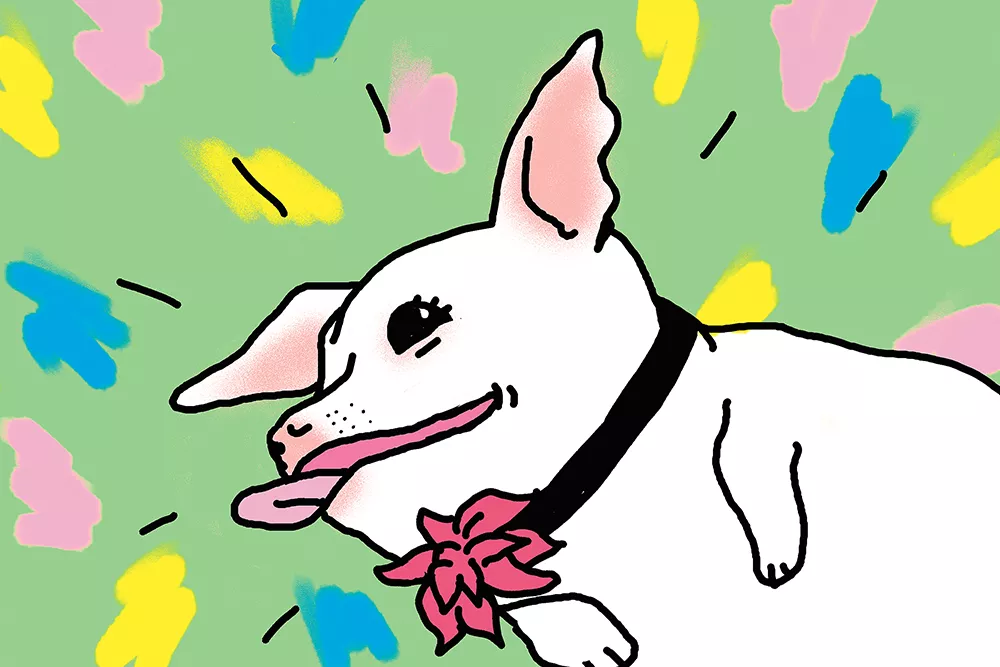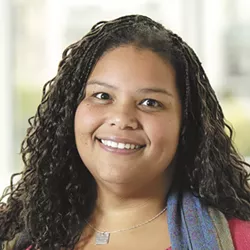My Dearest Fern Mayo:
If we're being honest, I never really considered myself much of "a dog person." I had this belief that taking care of one would require more energy than I wanted to expend; fearing the weight of your happiness resting solely on me. Knowing that I would bear responsibility for so much care made me view this would-be-relationship as a codependent one — scratch that — as an entirely dependent one to avoid. Also, you are smelly. For these reasons, I imagined cats as more aligned with my interests. Sure, they can be a bit smug — often cold, coy and elusive — but they are fairly self-reliant and so for most of my life, this is what I felt most comfortable chasing.
Until you.
I'll admit, I noticed you right away. Your rotund, white belly supported by tiny, furry frame atop baby pink paws — a perfect color match to your petite, protruding and lopsided tongue. Denying your adorableness was futile. So at first I acknowledged, but kept a "safe" distance, just a few awkward rubs that lacked any real commitment. As I departed, I was easily able to leave thoughts of you behind. Then you literally moved into my life, and before I even recognized it within myself, people were commenting on our connection. When I was away, my mind started drifting to thoughts of you — like whether you could access your tiger blanket. Occasionally, I received videos. You would delight me with performances of the most mundanely fascinating feats.
After work, you would meet me at the door, do that cute, tail-wagging dance, and bring me straight to my knees, melting me into a puddle on the floor beside you, as I abandoned all that I carried. If I moved a millimeter toward the couch, you were right on my heels, bounding up before I even had a chance to settle in and "assume the position." You stretched and squirmed your way into my legs, the crook that I swear was designed just to hold you. I knew I had passed the point of no return when I wondered aloud whether doggy laser-tag vests existed.
Fern, I'm not sure whether we possess similar types of comprehension, but I do hope you grasp the ways you've managed to shift my life. I was convinced that I knew what I wanted and needed. I was wrong. Because of you, I see the world differently. Where I hardly paid attention prior, I now notice pups everywhere. I reach out where I surely would have remained distant before.
Recently, you moved out of my home and into one of your own. My friends, sensing my sadness, encouraged me to adopt, but I hesitated. Though I would be excited to have a new one in my life, I still worry that I am not quite home enough. Is that what love is, Fernie? Putting aside our own desire because ultimately it might not match up with someone else's best interest? Is it stomaching smells that once repulsed, and tolerating (or even coming to enjoy) the responsibilities of reliance? Does love unfold in awareness, in the recognition that we can be different than originally envisioned? Does it derive from an understanding that caring deeply can cause us to change? Is love learning to internalize our greatest capacity, that of acceptance? In finally being willing to receive the sweetest kind of tenderness in existence and desiring to give it all back in return? Fern, maybe love is simply embracing the questions without that gnawing need for any answers, save one — you.
Forever, Your Inga ♦
Inga N. Laurent is a local legal educator and a Fulbright scholar. She is deeply curious about the world and its constructs and delights in uncovering common points of connection that unite our shared but unique human experiences.


















